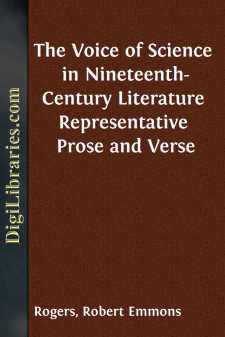Categories
- Antiques & Collectibles 13
- Architecture 36
- Art 48
- Bibles 22
- Biography & Autobiography 813
- Body, Mind & Spirit 142
- Business & Economics 28
- Children's Books 14
- Children's Fiction 11
- Computers 4
- Cooking 94
- Crafts & Hobbies 4
- Drama 346
- Education 46
- Family & Relationships 57
- Fiction 11828
- Games 19
- Gardening 17
- Health & Fitness 34
- History 1377
- House & Home 1
- Humor 147
- Juvenile Fiction 1873
- Juvenile Nonfiction 202
- Language Arts & Disciplines 88
- Law 16
- Literary Collections 686
- Literary Criticism 179
- Mathematics 13
- Medical 41
- Music 40
- Nature 179
- Non-Classifiable 1768
- Performing Arts 7
- Periodicals 1453
- Philosophy 64
- Photography 2
- Poetry 896
- Political Science 203
- Psychology 42
- Reference 154
- Religion 513
- Science 126
- Self-Help 84
- Social Science 81
- Sports & Recreation 34
- Study Aids 3
- Technology & Engineering 59
- Transportation 23
- Travel 463
- True Crime 29
The Voice of Science in Nineteenth-Century Literature Representative Prose and Verse
Description:
Excerpt
MATTHEW ARNOLD
THE FUNCTION OF CRITICISM
The critical power is of lower rank than the creative. True; but in assenting to this proposition, one or two things are to be kept in mind. It is undeniable that the exercise of a creative power, that a free creative activity, is the true function of man; it is proved to be so by man’s finding in it his true happiness. But it is undeniable, also, that men may have the sense of exercising this free creative activity in other ways than in producing great works of literature or art; if it were not so, all but a very few men would be shut out from the true happiness of all men; they may have it in well-doing, they may have it in learning, they may have it even in criticizing. This is one thing to be kept in mind. Another is, that the exercise of the creative power in the production of great works of literature or art, however high this exercise of it may rank, is not, at all epochs, and under all conditions, possible; and that, therefore, labor may be vainly spent in attempting it, and may with more fruit be used in preparing for it, in rendering it possible. This creative power works with elements, with materials; what if it has not those materials, those elements, ready for its use? In that case it must surely wait till they are ready. Now, in literature,—I will limit myself to literature, for it is about literature that the question arises,—the elements with which the creative power works are ideas; the best ideas on every matter which literature touches, current at the time; at any rate, we may lay it down as certain that in modern literature no manifestation of the creative power not working with these can be very important or fruitful. And I say current at the time, not merely accessible at the time; for creative literary genius does not principally show itself in discovering new ideas—that is rather the business of the philosopher; the grand work of literary genius is a work of synthesis and exposition, not of analysis and discovery; its gift lies in the faculty of being happily inspired by a certain intellectual and spiritual atmosphere, by a certain order of ideas, when it finds itself in them; of dealing divinely with these ideas, presenting them in the most effective and attractive combinations, making beautiful works with them, in short. But it must have the atmosphere, it must find itself amidst the order of ideas, in order to work freely; and these it is not so easy to command. This is why great creative epochs in literature are so rare; this is why there is so much that is unsatisfactory in the productions of many men of real genius; because, for the creation of a master-work of literature, two powers must concur, the power of the man and the power of the moment, and the man is not enough without the moment; the creative power has, for its happy exercise, appointed elements, and those elements are not in its own control.
Nay, they are more within the control of the critical power. It is the business of the critical power, as I said in the words already quoted, “in all branches of knowledge, theology, philosophy, history, art, science, to see the object as in itself it really is.” Thus it tends, at last, to make an intellectual situation of which the creative power can profitably avail itself....


